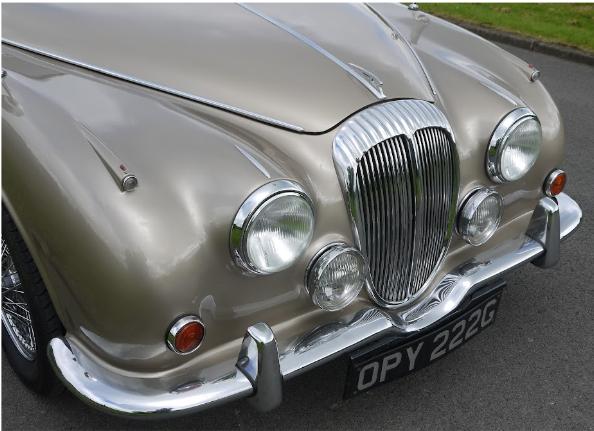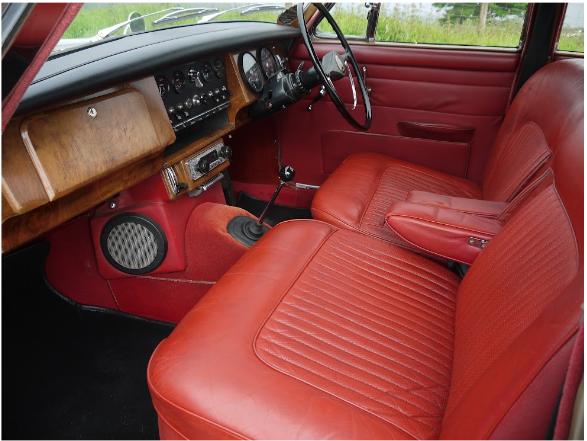 Last
revised 4th January, 2025
Last
revised 4th January, 2025 Last
revised 4th January, 2025
Last
revised 4th January, 2025
1968
Daimler V8 250
Manual
with Overdrive
By 1960, aside from the occasional Limousine, Daimler were producing their opulent large saloon, the Majestic Major (4.5 litre V8), and the SP250 up-market sports car but were developing a sports saloon (DN 250) to be powered by the same 2.5 litre V8 engine as the SP250.
Jaguar cars, who needed to expand their production and engineering capability, bought Daimler in 1960 but, in one of many cost-cutting exercises, they cancelled development of the new Daimler body in favour of the already highly regarded Jaguar Mk II body shell. In fairness, this worked out fairly well.
In 1966 Jaguar were in turn purchased by British Motor Corporation, which became British Motor Holdings and in 1968 became British Leyland Motor Corporation. In later years, the conglomerate was partly nationalised before eventually being broken up and sold off in separate parts, the most viable one being Jaguar Land Rover (though foreign owned now for many years).
Photos are courtesy of Birchfield Classics, Stockport.
So, the 2½ LITRE V8 had come about as an alternative to the wholly Daimler DN 250 sports saloon previously under development. It utilised the unitary body shell from the Jaguar Mk II cars and the 'Edward Turner' V8 Daimler engine from the SP250 sports car. In other words a very different kettle of fish from the Mk II Jaguar, which already had its loyal following.
Among other differences,
the Daimler had far
superior handling characteristics, as a result of its different weight
distribution.
The V8 250 (1967-69) is what, in modern parlance, would be called the 'facelift' version with a name change (in line with 2.4 Litre Mk II Jag becoming the 240) and some cosmetics (mainly the narrower bumpers). Availability of manual transmission, with or without overdrive on top gear, had become available during 1966.


The
Daimler enjoys the smooth V8 engine, with its extra power and
torque, cleaner handling and a little more luxury.
Though
fairly short lived (1962-69), the Daimler V8 250 had made its mark.
Last real Daimler car (though some owners of earlier Daimlers may dispute this)
First and only real Daimler without a separate chassis
Best selling Daimler in history.
My actual car:
It was originally sold by J H Naylor & Sons of Northallerton, on 1st September 1968, when the list price would have been £1,616 including purchase tax.
Nowadays, it is the most sought after version, with both manual transmission and overdrive on top gear. Manual/overdrive was only available from 1966 and not sold in huge numbers, Daimler buyers generally preferring automatic transmission. It is therefore quite rare. Of course there may be cars that were originally supplied as automatics and later converted to manual but I'm assuming mine is the way it was originally supplied.
Like most of these cars, which were certainly not designed for long term survival, mine has experienced repeated spells of restoration during its 56 year life. Surprisingly, it doesn't seem to have been out of commission for more than a year or so at a time and has been MOT tested very consistently. There are photos of a major engine strip down in 1995.
It has had several re-sprays, one of which, in 2013, was a complete, bare metal exercise. As far as I can tell it was originally gold but has also been green, immediately prior to the 2013 re-spray.
It is very much as it would have left the factory back in 1968. Wire wheels and even radial tyres (Dunlop SP41s) were both available as optional extras but there's probably no way to find out if my car had them from new. The current wheels will be replacements but there are various historical photos, going back at least 30 years showing the car with wire wheels.
There are lots more photos HERE, courtesy of Birchfield Classics.
As it happens, when I first decided to mess with classic cars other than Series Land Rovers, which would have been around the mid 1990s, I bought one of these that had been mostly restored by someone else and just needed some re-assembly and cosmetic work, followed by a re-spray.
Unfortunately, I hadn't realised it would almost fill my modern garage and it was virtually impossible to work on in there. I loved the car but, to my shame, I eventually sold it in much the same condition as I bought it.
The one I now have is an identical car (except for the wire wheels), even down to the year and paint colour, so I just couldn't resist it.
Return to My Cars and Bikes.